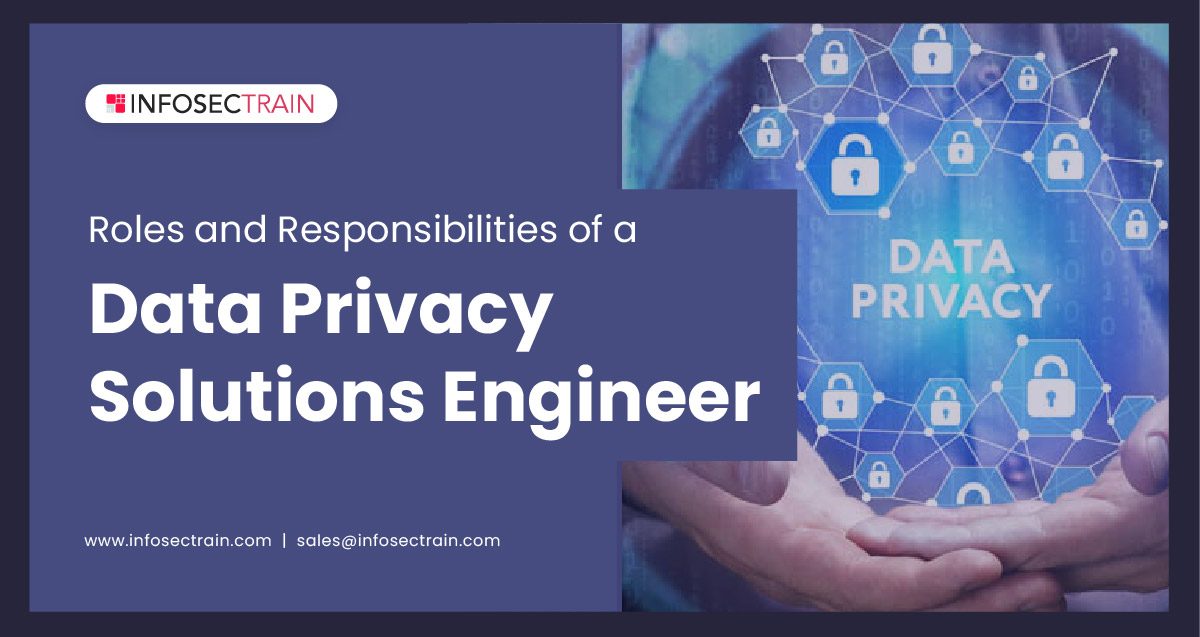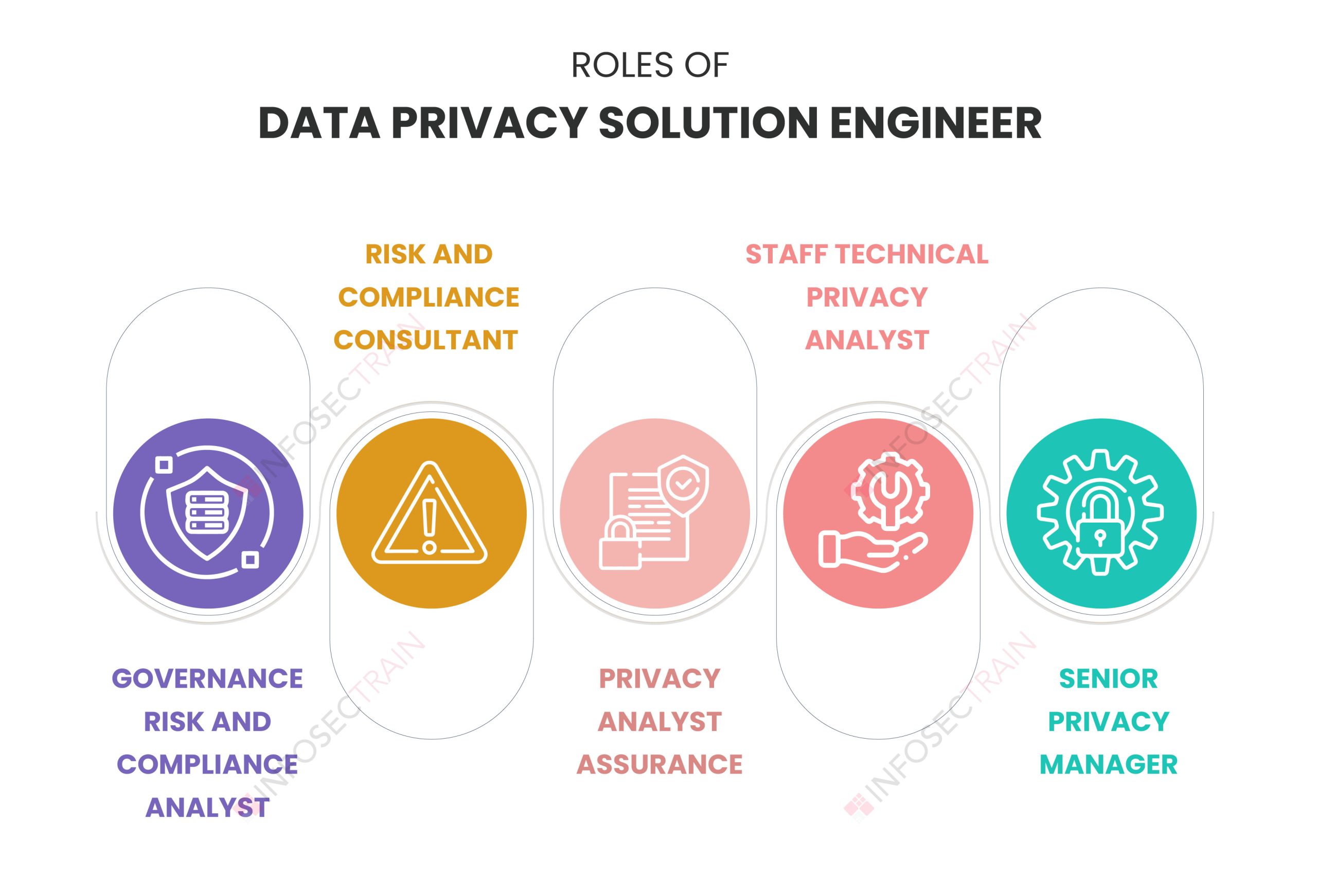Roles and Responsibilities of a Data Privacy Solutions Engineer
We live in a digital era with countless technical developments, and data is everywhere. With more Social, Economic, and Governmental activities being conducted online, the flow of personal data is steadily increasing, prompting concerns about its storage and use. Data has become a Golden goose for cyber civilization’s dark doers. The ability to manage how, when, and how much personal information is shared with others is referred to as data privacy. It is critical to know who is keeping an eye on our web activity and what they do with the information they collect.

Who is a Data Privacy Solution Engineer?
The Certified Data Privacy Solution Engineer (CDPSE) is the person who has the technical abilities and knowledge required to assess, create, and deploy complete privacy solutions. CDPSE provides enterprises with a good and reliable way to identify technologists capable of incorporating privacy by design into technology platforms, products, and processes, communicating with legal professionals, and keeping the organization compliant efficiently and cost-effectively. CDPSE demonstrates that your team possesses the technical abilities and knowledge required to assess, create, and deploy a comprehensive privacy solution while increasing business value, customer insights, and trust—ultimately boosting the image of your organization.
Roles of Data Privacy Solution Engineer
The Data Privacy Solutions Engineer is responsible for implementing privacy solutions’ technical and governance aspects. Following are the roles of a Data Privacy Solution Engineer:

1. Governance, Risk, and Compliance Analyst
Compliance Analysts monitor the work of organizations and businesses to ensure that they are in accordance with the local, federal, and state government requirements. As the defender of compliance inside and outside the organization, professionals seek to ensure that their employer’s operations follow the criteria imposed by the government or nonprofit entities that regulate them.
2. Risk and Compliance Consultant
Risk Consultants and Compliance Consultants have professions that are related but unique. They aim to mitigate the possible harm that could affect an entity if regulations are not followed, but from different perspectives.
- Risk Consultant: Risk Consultants assess possible risks that an enterprise may encounter and create risk-mitigation methods. A risk consultant’s responsibility is to defend an organization, and they also work to keep the organization from having problems in the future.
- Compliance Consultant: Compliance Consultants examine the organization’s standards, industry regulations, and federal law to ensure that the organization’s actions are legal and adhere to all requirements. A compliance consultant’s job is to ensure that the organization does not violate any rules or regulations to avoid problems.
3. Privacy Analyst-Assurance
Privacy Analyst-Assurance analyzes and reports on different trends. Analysts strive to derive insights from publicly available or collected data to generate effective plans in multiple sectors. It may be necessary for analysts to be adaptable, operate across numerous industries with various sorts of data, and put a lot of effort into producing and delivering reports.
4. Staff Technical Privacy Analyst
A Staff Technical Privacy Analyst conducts a variety of specialized job tasks while at work. Staff Technical Privacy Analysts frequently perform the following responsibilities:
- Technical Privacy Analysts research organizations and collect data to build a foundation of knowledge about firms’ market interests and worth.
- Analyzing the data collected during research and making inferences from it is one of a Technical Privacy Analyst’s primary responsibilities.
- Technical Privacy Analysts frequently collaborate with specialists in the field to develop hypotheses and produce findings.
5. Senior Privacy Manager
A Senior Privacy Manager employs coding expertise to maintain secure databases while analyzing the data requirements of the business or research group. The received data is then gathered and organized. A Senior Privacy Manager analyzes data and makes decisions based on their findings using their analytics knowledge and various coding applications. Additionally, they communicate results to management utilizing mathematical and statistical theory methodologies, which are applied to improve different organizational projects.
Responsibilities of a Data Privacy Solution Engineer
Organizations are developing various technical systems required for compliance goals and successfully managing a contemporary privacy program as additional privacy legislation emerges. The obligations associated with them continue to expand and grow more complicated. With “privacy” becoming a significant topic, most firms are concerned about whether their organization’s “privacy gaps” are appropriately addressed. In an organization, a Data Privacy Solution Engineer will adopt technical privacy by design principles to reduce risk and impose penalties for non-compliance with privacy measures.
Data Privacy Solution Engineer jobs come with a lot of responsibilities, including:
- Create, develop, and implement comprehensive privacy by design programs across the enterprise to improve the incorporation of privacy and compliance in products and processes.
- Design and maintain a suitable governance architecture for privacy and product compliance while designing programs to support the development of processes and products.
- Organize meetings with client stakeholders to collect intellectual, operational, and commercial needs for use instances and future state designs throughout their technology ecosystem.
- To assist clients in automating their privacy capabilities and improving customer experiences, configure, integrate, test, and deploy privacy tools and technologies.
- Assist external or internal auditors with compliance audits.
- Assist in the assessment of suspected privacy events and breaches.
- Internal audits are used to monitor internal compliance with privacy rules and standards.
- Determine the general privacy-related weaknesses brought on by improper data actions.
- Manage extensive, complex privacy initiatives and keep an eye on reviews of worldwide programs and activities for data protection.
- Use data anonymization, pseudonymization, and encryption to create systems that protect and promote privacy.
Data Privacy Solutions Engineer with InfosecTrain
Highly qualified and experienced privacy specialists deliver InfoSecTrain’s CDPSE certification training course. They have earned the certification through exceptional knowledge and years of experience. The candidate is kept in mind while carefully developing the course content. So check out InfosecTrain for your preparation.







 1800-843-7890 (India)
1800-843-7890 (India)